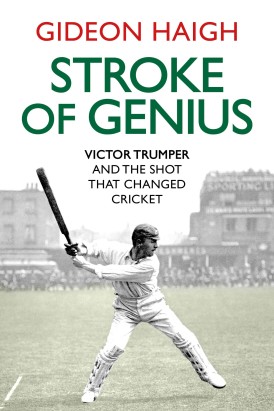Stroke of Genius
Martin Chandler |Published: 2016
Pages: 315
Author: Haigh, Gideon
Publisher: Simon and Schuster
Rating: 4 stars

The internet has revolutionised our lives. One of the important ways it has done so is by allowing people with specific interests, who without it would have pursued their hobbies in isolation for their entire lives, to spend time with like-minded souls, even if only in a virtual world. The camaraderie of those interested in cricket literature is an example.
There are few with an interest in the game who have not sought out information about Victor Trumper, a man whose batting skills caused all who saw him and wrote about their experience to wax lyrical. Anyone who has read Cardus on Trumper wanted to read a full biography of the great man. The wait was a long one, until 1978.
The Immortal Victor Trumper should have been a better book than it was. Author Jack Fingleton was a fine writer who in his playing days knew men who had played with and against Trumper. But ‘Fingo’ was well past his best when the book was written, and it is disappointing. Later books by Peter Sharpham and Ashley Mallett both have their moments, but neither is the record of Trumper’s life that his reputation warrants.
One thing I have picked up over recent years, as a result of the coterie of fellow cricket tragics I have gradually acquired, is the general level of dissatisfaction with those existing biographies. I first learned Gideon Haigh was writing a book about Trumper about a year ago. Soon after however I found out Stroke of Genius was not going to be a biography. Having excitedly broken the news that we were at last to see the book all had been waiting for I felt a little embarrassed to have to inform people my announcement had been premature.
All had hoped that the writer who has already demonstrated his pedigree as a biographer with masterly efforts on Warwick Armstrong and Jack Iverson was the man to produce the genuine article. Haigh however, no doubt wisely, did not set out to write a traditional biography or, if he did, it was a project he abandoned. It may be of some consolation that he does at least explain why the book so many want to read is, barring some substantial personal archive suddenly coming to light, to all intents and purposes impossible to produce.
I used the word ‘traditional’ with some care in the preceding paragraph because there are many biographical elements to Stroke of Genius. The simplest way of explaining what it amounts to is to describe the book as a biography of the iconic image that graces its dust jacket, and Trumper’s legacy, rather than of the man himself. There is therefore very little in the book by way of accounts of the matches in which Trumper played, but a great deal about some aspects of his life, and what set him apart from his peers and successors.
There are some areas of Trumper’s life that none of Fingleton, Sharpham and Mallett fully dealt with and which Haigh adds to. Two examples are his being courted at his peak by English counties, particularly Worcestershire, and his signing and then failing to fulfil a contract to write for an English newspaper in 1905. Conversely in other elements of Trumper’s life Haigh explains the impossibility of getting together sufficient material to properly deal with them. The most significant example here is perhaps in relation to his finances and how a man with such a potential for earning money was, by the time of his tragically early death in such straitened circumstances. Generosity of spirit and a lack of ruthlessness in business is the answer in general terms, but the details of a complex story are long gone.
The centrepiece of Stroke of Genius is that single photograph, ‘Jumping Out’. There is something of the history of photography about the book, and a detailed look at the life of the man behind the lens, George Beldam. Haigh’s narrative constantly returns to ‘Jumping Out’. The image is, in one form or another, reproduced five times on the dust jacket, on 22 occasions in the photographic section, and another 13 illustrations of it are woven into the text.
That the reader never tires of seeing ‘Jumping Out’ is testament to the purpose of the book, as are the three images of others trying to re-enact the shot. Dean Jones, no mean stroke player himself, makes a poor effort. The laurels there are shared by Belinda Clarke and an unnamed actor who reproduced the shot for a photograph taken on Victor Trumper Day in 2008. Had it not been for a pair of skeleton pads wholly lacking any trace of authenticity the anonymous thespian would probably have shaded it, but all the three impersonators really do is underline the real message. There has never been another batsman like Victor Trumper, and never will be. Gideon Haigh has produced a fitting tribute.






Leave a comment